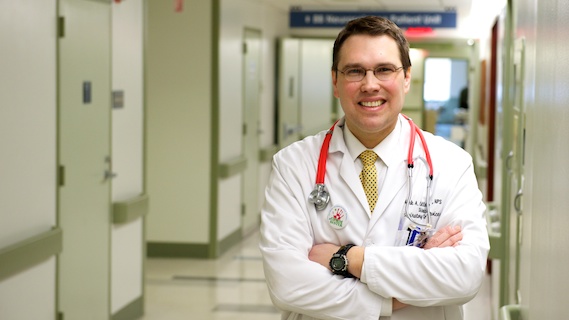
Mark Collazo, a Registered Respiratory Therapist and Neonatal Pediatric Specialist, literally worked his way up to being Director of Respiratory Care Services at St. Luke’s Roosevelt Hospital.
“I was working in the basement, in the kitchen at St. Luke’s as a food service aide, delivering food to the patients and washing dishes,” he says. “Before that, I was working as a bike messenger, and the winters were tough.”
“Don’t give up.”
Before finding his food service job at St. Luke’s, Collazo applied for a volunteer position, and was placed in the Respiratory Care department, where his interest in the field began.
“I had been at BMCC but left during this time, and by then I had kids and was working nights, so it was tough,” he says.
“I applied to Empire State College, and they saw I only needed four credits to get my associate degree, so they advised me to go back to BMCC, then complete 32 credits with them, for a bachelor’s degree.”
Collazo admits he was a little nervous returning to BMCC after a few years away, “but Everett Flannery [head of Allied Health at BMCC] welcomed me back with a big hug,” he said.
He graduated with an Associate in Applied Science in Respiratory Therapy from BMCC in 1999, and completed his Bachelor of Science in Health Services from Empire State College, in 2001.
“I want to say to people who are thinking about going back to school, ‘Don’t give up’,” he says.
“You think you’re too old, you have a family and it will be hard, but it’s actually easier, because you have wisdom, more motivation. And BMCC is great. They really try to accommodate for your work schedule and family life.”
Education: A family affair
“My wife also graduated from BMCC with an associate degree in respiratory therapy,” Collazo says. “She was pregnant with our second child when she began the program. We were the quintessential family trying to improve our lives.”
His daughters are now young adults, and “my two youngest are at Hunter College,” he says. “The oldest girl just passed the bar, and she’s practicing family law in New Jersey.”
Collazo himself was born on Long Island, but his family moved back to Spain when he was six.
“I’m an international guy,” he says. “My mom is from Brazil, and she met my dad here, when they were taking English language classes.”
After completing high school in Spain, “my dad encouraged me to return to the U.S.,” Collazo says. “He loves this country. He says there is no country with more opportunity than the U.S. I came here after high school and I got hooked.”
Today he pays forward, the encouragement his father gave him.
“I tell my kids, education is a life process. The hardest part is taking the subway, making that first appointment and going to the admissions office. At BMCC, I found out that once you get that far, they don’t let you go.”
“Nothing better for the money”
“In respiratory therapy programs, things have gotten even more rigorous because of technology,” Collazo says. “You’ve got to be doing continuing education constantly, just to keep up.”
At BMCC, he says, those changes in technology are reflected in the labs and equipment students practice on.
“It’s a state-of-the-art program,” he says. “There’s nothing better for the money—you don’t want to graduate with big loans. At BMCC, you do all the core credit classes you would do in a more expensive bachelor’s degree program in RT.”
Another advantage of the BMCC program, he says, “is that the students complete a lot of hands-on practice with actual patients—after they get the techniques down, by performing procedures on simulators.”
Collazo also has an important role working with RT majors who complete their practicum at St. Luke’s. “I oversee the students’ clinical development,” he says.
And as director of RT services at St. Luke’s, “we set the policies for the department and oversee the competencies and staff training,” he says, “but I also see myself as a facilitator, guiding new RTs in their skill development.”
The rewards of being an RT
“The RT field is really expanding and moving into areas of preventive medicine, home care, teaching, clinics, sleep labs,” Collazo says. “You can find what you’re passionate about, and build a career around that area.”
Being an RT, he says, can also be rewarding on a personal level.
“My wife has asthma, and my kids had asthma when they were growing up, so it motivated me to learn about respiratory health,” says Collazo, who is not only a Respiratory Therapist, but earned additional certification as a Neonatal Pediatric Specialist.
“You want to relate to patients, but also to their parents,” he says, “and it helps if you’ve also been up with your own kids having a hard time breathing late at night.”
Wellness education, overall, is a growing part of the role of a respiratory therapist, he explains.
“City air is not the cleanest, so we teach people about allergens, nutrition, and triggers they have at home, like pets or dust mites. We encourage them to get a vaporizer in the winter, because the air can be so dry.”
Reaching out to young people is also part of his job. “We bring equipment and do presentations at schools and do workshops with the teachers,” he says.
As far as Collazo is concerned, the less he sees a patient—young or old—in an emergency setting, the better.
“Helping people manage their respiratory disease to the point where they don’t have to go to the hospital so often, empowering them to manage their own health, well that’s very satisfying,” he says.

